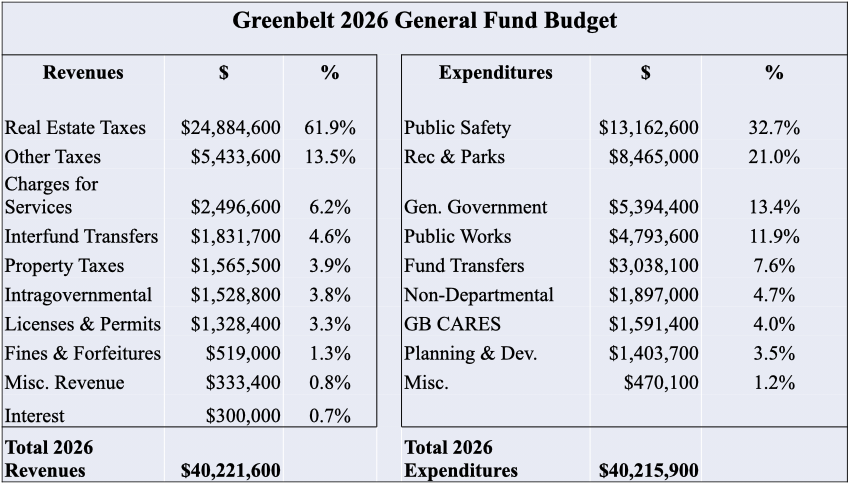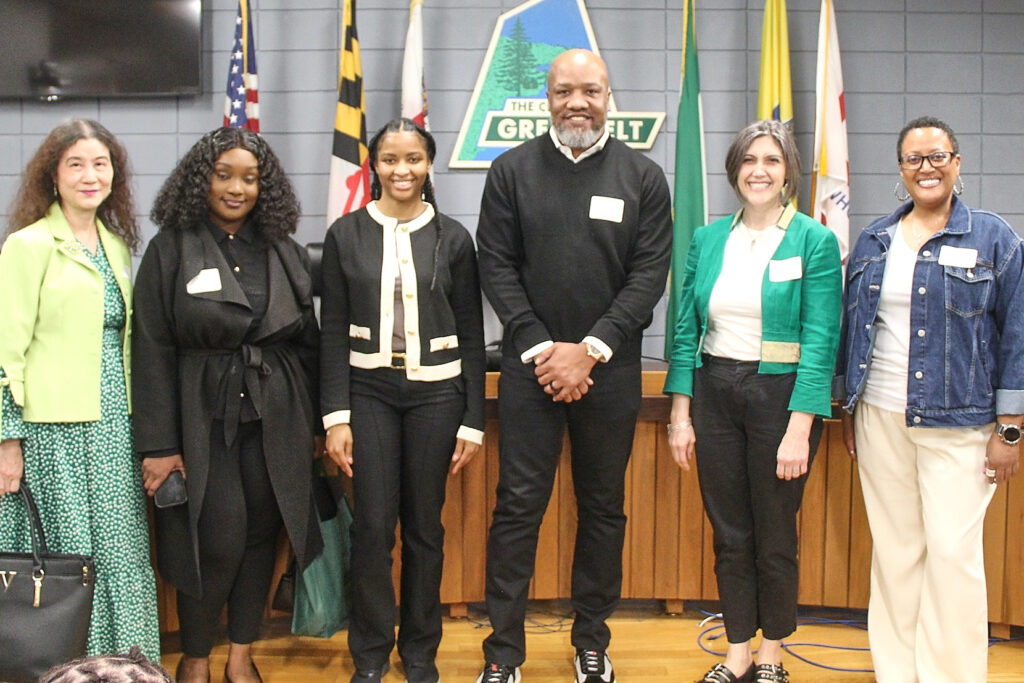On Monday, March 24, the Greenbelt City Council heard a report from the city’s auditor of last year’s budget and began the Fiscal Year (FY) 2026 budget process with a presentation by the City Manager Josué Salmerón.
The recent audit of FY 2024, conducted by Mitchell Titus, gave the city a clean bill of health. Daniel Kenney, engagement partner for Mitchell Titus, gave a presentation on their findings. No deficiencies or weaknesses were found in the audit for the period ending June 30, 2024.
Mayor Emmett Jordan expressed gratitude to the team supplying the data with special thanks to City Treasurer Bertha Gaymon.
2026 Budget Presentation
Salmerón went over the proposed FY 2026 budget for the city and discussed the changing budget projections due to the current atmosphere in the federal government and the state’s constrained budget. (For the recent FY 2026 budget worksession see page 8). Currently, the total budget for 2026 stands at $52.5M and is composed of $40M in the general fund, $7.4M in capital projects, and nearly $5M in other funds and supports 234.5 full-time equivalent (FTE) positions. The 2026 general fund estimates revenues will be $40,221,600 and expenses will be $40,215,900 with a positive difference of $5,700. Compared to last year’s budget, revenues are expected to increase by 5.76 percent and expenses by 5.69 percent. In addition, the number of positions will be reduced by 13.2 FTE which includes both unfunded and vacant positions plus having some positions funded by American Rescue Plan Act (ARPA) money (changes in ARPA rules have allowed this shift). Also, the Recreation and Parks Department will have a reduction of $129,500 (or 2 percent) compared to last year’s budget through reduced staff hours, unfilled positions, fewer uniforms/equipment and other actions.
Mayor Emmett Jordan recognized that the rules for how ARPA funds could be spent have changed and asked what the implications are for shifting positions from the general fund to ARPA funds. Salmerón said that for FY 2026 it provided relief from having to use general funds but that for FY 2027 the city would need to plan to pay for those positions using general funds. Regarding ARPA funds Salmerón said the city is doing everything by the books and is prepared to be audited.
Budget Process
Council discussed but took no action on Councilmember Danielle McKinney’s recommendations aimed at making the upcoming budget worksessions more efficient and productive. She had several recommendations including having council submit questions to staff two days prior to the worksession, convene a town hall specifically on the budget to allow for more public input, have members of the public submit questions prior to the worksession and allow members of the public up to two (2) opportunities to comment or ask questions during each worksession.
Jordan liked the idea of having a town hall on a Saturday and felt that perhaps a longer session on a Saturday would allow for more business to be completed. He also noted that a town hall would require staff to develop a different type of presentation.
Councilmember Rodney Roberts did not agree with limiting the public’s input during a worksession and believed that not many members of the public would attend a Saturday session.
Councilmembers Silke Pope and Kristen Weaver liked the idea of submitting council questions two days prior to the meeting but Pompi felt that not everyone would be able to meet such a deadline. She also liked the idea of a Saturday town hall. As far as the public asking questions during the session, she thought about maybe having them at the end of the meeting.
Resident and former mayor J Davis noted that every time there is a budget session folks complain and each time, council tries to change it. Council has tried before to submit questions prior to the worksession and found that some members are good at turning in questions and others are not, she said. She felt that the questions from council are much more numerous during the discussion than the number of questions submitted beforehand. She also noted that limiting public input during a session sends a message that you are biased against those who actually took the time to read the material and ask questions.
No action was taken on the recommendations and the session ended with Jordan saying that it needs to be worked out, but “… that we can’t work it out right now at 20 minutes before midnight.”




